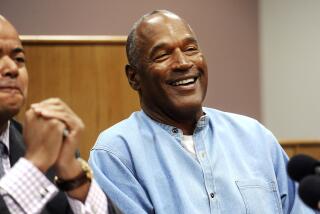And Now, Shapiro’s Take on the O.J. Trial
- Share via
Robert Shapiro, the lawyer who assembled O.J. Simpson’s defense team, says he believes prosecutors committed two major errors when they built much of their case on controversial detective Mark Fuhrman’s testimony and “bored” the jury with “an endless defense” of DNA tests.
Nevertheless, writing in “The Search for Justice,” Shapiro’s new memoir of the murder case against Simpson, the lawyer repeats his post-trial assertion that co-counsel Johnnie Cochran unnecessarily played a so-called race card.
“Race shouldn’t be an issue here,” Shapiro says he told Cochran during the proceedings.
“ ‘It’s always an issue, Bob,’ Cochran said. ‘It’s an issue in everything in life.’ ”
When Shapiro replied, “But I hoped it wouldn’t be. I believed it wouldn’t be,” Cochran smiled and said: “That’s because you’re not black.”
Shapiro’s book, which will be published next week by Warner Books, also contains the following details.
On rumors about a plea bargain: “Since my client steadfastly maintained his innocence from the beginning and never once wavered, there was never a plea bargain considered by anyone.”
On the disguise and large sum of cash found in Simpson’s Ford Bronco: “The mustache-and-beard disguise had been ordered by him some weeks before . . . so that he could take his children to an amusement park without being recognized. . . . The cash was his ‘pocket money’ used for golf, gambling, tipping, et cetera” on his frequent trips around the country.
On the mysterious manila envelope turned over by the defense before trial: It contained a knife purchased by Simpson at a cutlery shop whose owner testified. But the knife, which was retrieved from a dressing table in Simpson’s bedroom by a retired jurist whom Judge Lance Ito had appointed to the task at the defense’s request, “had never been used at all, for anything.”
On the choice of a co-counsel: “O.J.’s coterie felt that [F. Lee] Bailey had lost his fastball.” As a result, it was a toss-up between Cochran and Gerry Spence, the colorful Wyoming attorney who had won an acquittal for Imelda Marcos and wanted to join the Simpson team. “The real drawback to Spence was his schedule. . . . I needed someone here hands-on, every day.”
On F. Lee Bailey: The memoir is peppered with unflattering anecdotes about Shapiro’s former mentor, who technically had been a consultant to the defense but, according to the author, unexpectedly finessed a seat at the trial and leaked information to the press.
On the cost of Simpson’s defense: After months of preparation, with the trial still unscheduled, “We had to do something to cut costs.” One investigator would leave the case, another agreed to a pay cut and defense attorney Alan Dershowitz said he would trim his fee in the event of an appeal. “Indeed, all the defense attorneys and experts are still owed large sums of money.”
On Simpson’s role: “O.J. was more and more integral to the defense. . . . He insisted on getting copies of every motion and memo. . . . He would be on the phone late into the night with Dershowitz . . . with me and with Cochran.”
On the bloody gloves: Shapiro writes that he tried on the gloves, compared hand sizes with Simpson and realized that they would never fit the defendant. As a result, the defense objected “for the record” to prosecutor Christopher Darden’s request that Simpson put on the gloves, knowing that Ito would grant it. “Our case was at a turning point, and Chris Darden was going to take us through the turn, just like the engineer on a train. . . . The gloves didn’t fit.”
On prosecutor Marcia Clark’s “flirting regularly” with Cochran: “Once at a sidebar conference, she said to him, ‘You just call these sidebars so you can stand next to me.’ ” The flirtation unsettled Simpson, but Cochran told Shapiro, “I’ll handle O.J.”
On the verdict: “I have no better way of judging guilt or innocence than anyone else. However . . . ‘not guilty’ was the only verdict that could have been returned.”
* Paul D. Colford is a columnist for Newsday.
More to Read
Sign up for Essential California
The most important California stories and recommendations in your inbox every morning.
You may occasionally receive promotional content from the Los Angeles Times.













